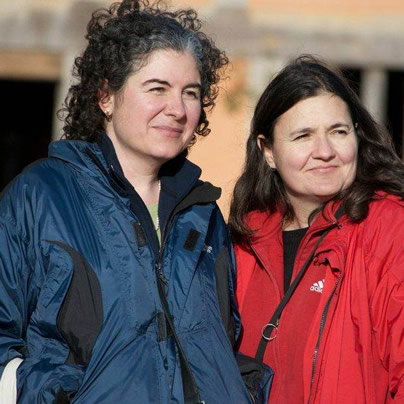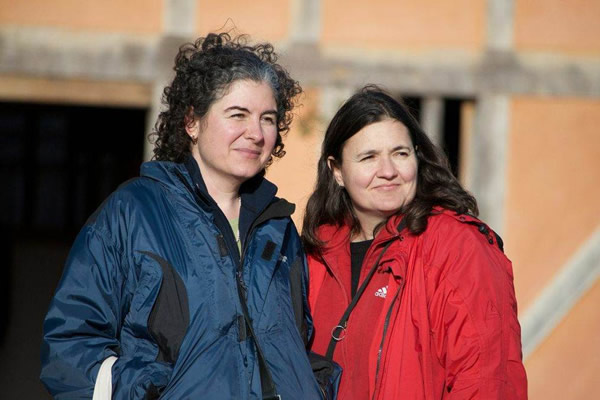National
Lesbian couple alleges discrimination at Colombia airport
Women say security personnel separated them before flight to Miami

Ana Elisa Leiderman told the Washington Blade during a telephone interview from Raleigh, N.C., on Jan. 7 that an American Airlines ticket agent at the airport in the Colombian city of Medellín separated her from her wife, Verónica Botero, and their two small children as they tried to check-in to their Miami-bound flight on Dec. 13.
Leiderman said she insisted she wanted to go through the security screening with her wife and their children.
“She said, ‘oh no, for security purposes you stand over there,’” Leiderman told the Blade.
Leiderman said the ticket agent told her that she would have allowed her and Botero to go through security together if they had been a man and a woman.
“I said, ‘but you’re discriminating,’” recalled Leiderman. “’We are both their parents and we are a family and we should do this together.”
Leiderman told the Blade she requested to speak with the ticket agent’s supervisor.
She said the supervisor told her she and Botero would have been allowed to go through security together if they had been a man and a woman.
“He was just not looking very happy and not saying much,” Leiderman told the Blade. “That was it and there was no discussion and we had no recourse.”
Leiderman copied Colombia Diversa, an LGBT rights group, on a letter she sent to American Airlines on Dec. 17 about the alleged incident. She told the Blade the company has yet to respond to it.
“When asked if man/woman couples are separated, the agent said no, but that we were being separated for security reasons,” Leiderman wrote. “This is clearly discrimination of same-sex couples on your part. And I sincerely hope this is not your company policy.”
An American Airlines spokesperson told the Blade on Jan. 10 the company regrets “the circumstances Ms. Leiderman faced with her spouse and family while traveling from Colombia to the U.S. and understand her concerns.” The spokesperson said airport personnel in Medellín “followed existing security screening rules mandated by the” Transportation Security Administration.
“Prior to this incident, American has flagged for TSA the fact that same-sex and opposite sex married couples faced different screening procedures, and recommended that TSA officials revisit and update the process so that all married couples can be treated equally in the future,” the spokesperson told the Blade. “We hope that improvement can be made very soon.”
Colombian law bans discrimination based on sexual orientation, although homophobia and anti-LGBT violence remain pervasive in the South American country.
Leiderman has petitioned the Colombian government to legally recognize Botero as the legal parent of the children to whom she gave birth through artificial insemination. The women in 2008 entered into a civil union in Germany.
El Espectador, a Colombian newspaper, in November reported that Constitutional Court Justice Luís Guillermo Guerrero would conclude he could not deny adoption rights to same-sex partners simply because of their sexual orientation. Guerrero has yet to issue its ruling.
The country’s highest court in 2011 ruled lawmakers had two years to extend the same benefits to same-sex couples that heterosexuals receive through marriage — the June 20 deadline passed amid lingering confusion as to whether gays and lesbians could actually tie the knot in the South American country because the ruling did not contain the word “marriage.”
Colombian Attorney General Alejandro Ordóñez Maldonado and social conservatives have sought to challenge the handful of same-sex marriages that have been performed in the country since July.
U.S. Supreme Court
Supreme Court to consider bans on trans athletes in school sports
27 states have passed laws limiting participation in athletics programs

The U.S. Supreme Court on Thursday agreed to hear two cases involving transgender youth challenging bans prohibiting them from participating in school sports.
In Little v. Hecox, plaintiffs represented by the ACLU, Legal Voice, and the law firm Cooley are challenging Idaho’s 2020 ban, which requires sex testing to adjudicate questions of an athlete’s eligibility.
The 9th U.S. Circuit Court of Appeals described the process in a 2023 decision halting the policy’s enforcement pending an outcome in the litigation. The “sex dispute verification process, whereby any individual can ‘dispute’ the sex of any female student athlete in the state of Idaho,” the court wrote, would “require her to undergo intrusive medical procedures to verify her sex, including gynecological exams.”
In West Virginia v. B.P.J., Lambda Legal, the ACLU, the ACLU of West Virginia, and Cooley are representing a trans middle school student challenging the Mountain State’s 2021 ban on trans athletes.
The plaintiff was participating in cross country when the law was passed, taking puberty blockers that would have significantly reduced the chances that she could have a physiological advantage over cisgender peers.
“Like any other educational program, school athletic programs should be accessible for everyone regardless of their sex or transgender status,” said Joshua Block, senior counsel for the ACLU’s LGBTQ and HIV Project. “Trans kids play sports for the same reasons their peers do — to learn perseverance, dedication, teamwork, and to simply have fun with their friends,” Block said.
He added, “Categorically excluding kids from school sports just because they are transgender will only make our schools less safe and more hurtful places for all youth. We believe the lower courts were right to block these discriminatory laws, and we will continue to defend the freedom of all kids to play.”
“Our client just wants to play sports with her friends and peers,” said Lambda Legal Senior Counsel Tara Borelli. “Everyone understands the value of participating in team athletics, for fitness, leadership, socialization, and myriad other benefits.”
Borelli continued, “The U.S. Court of Appeals for the Fourth Circuit last April issued a thoughtful and thorough ruling allowing B.P.J. to continue participating in track events. That well-reasoned decision should stand the test of time, and we stand ready to defend it.”
Shortly after taking control of both legislative chambers, Republican members of Congress tried — unsuccessfully — to pass a national ban like those now enforced in 27 states since 2020.
Federal Government
UPenn erases Lia Thomas’s records as part of settlement with White House
University agreed to ban trans women from women’s sports teams

In a settlement with the Trump-Vance administration announced on Tuesday, the University of Pennsylvania will ban transgender athletes from competing and erase swimming records set by transgender former student Lia Thomas.
The U.S. Department of Education’s Office for Civil Rights found the university in violation of Title IX, the federal rights law barring sex based discrimination in educational institutions, by “permitting males to compete in women’s intercollegiate athletics and to occupy women-only intimate facilities.”
The statement issued by University of Pennsylvania President J. Larry Jameson highlighted how the law’s interpretation was changed substantially under President Donald Trump’s second term.
“The Department of Education OCR investigated the participation of one transgender athlete on the women’s swimming team three years ago, during the 2021-2022 swim season,” he wrote. “At that time, Penn was in compliance with NCAA eligibility rules and Title IX as then interpreted.”
Jameson continued, “Penn has always followed — and continues to follow — Title IX and the applicable policy of the NCAA regarding transgender athletes. NCAA eligibility rules changed in February 2025 with Executive Orders 14168 and 14201 and Penn will continue to adhere to these new rules.”
Writing that “we acknowledge that some student-athletes were disadvantaged by these rules” in place while Thomas was allowed to compete, the university president added, “We recognize this and will apologize to those who experienced a competitive disadvantage or experienced anxiety because of the policies in effect at the time.”
“Today’s resolution agreement with UPenn is yet another example of the Trump effect in action,” Education Secretary Linda McMahon said in a statement. “Thanks to the leadership of President Trump, UPenn has agreed both to apologize for its past Title IX violations and to ensure that women’s sports are protected at the university for future generations of female athletes.”
Under former President Joe Biden, the department’s Office of Civil Rights sought to protect against anti-LGBTQ discrimination in education, bringing investigations and enforcement actions in cases where school officials might, for example, require trans students to use restrooms and facilities consistent with their birth sex or fail to respond to peer harassment over their gender identity.
Much of the legal reasoning behind the Biden-Harris administration’s positions extended from the 2020 U.S. Supreme Court case Bostock v. Clayton County, which found that sex-based discrimination includes that which is based on sexual orientation or gender identity under Title VII rules covering employment practices.
The Trump-Vance administration last week put the state of California on notice that its trans athlete policies were, or once were, in violation of Title IX, which comes amid the ongoing battle with Maine over the same issue.
New York
Two teens shot steps from Stonewall Inn after NYC Pride parade
One of the victims remains in critical condition

On Sunday night, following the annual NYC Pride March, two girls were shot in Sheridan Square, feet away from the historic Stonewall Inn.
According to an NYPD report, the two girls, aged 16 and 17, were shot around 10:15 p.m. as Pride festivities began to wind down. The 16-year-old was struck in the head and, according to police sources, is said to be in critical condition, while the 17-year-old was said to be in stable condition.
The Washington Blade confirmed with the NYPD the details from the police reports and learned no arrests had been made as of noon Monday.
The shooting took place in the Greenwich Village neighborhood of Manhattan, mere feet away from the most famous gay bar in the city — if not the world — the Stonewall Inn. Earlier that day, hundreds of thousands of people marched down Christopher Street to celebrate 55 years of LGBTQ people standing up for their rights.
In June 1969, after police raided the Stonewall Inn, members of the LGBTQ community pushed back, sparking what became known as the Stonewall riots. Over the course of two days, LGBTQ New Yorkers protested the discriminatory policing of queer spaces across the city and mobilized to speak out — and throw bottles if need be — at officers attempting to suppress their existence.
The following year, LGBTQ people returned to the Stonewall Inn and marched through the same streets where queer New Yorkers had been arrested, marking the first “Gay Pride March” in history and declaring that LGBTQ people were not going anywhere.
New York State Assemblywoman Deborah Glick, whose district includes Greenwich Village, took to social media to comment on the shooting.
“After decades of peaceful Pride celebrations — this year gun fire and two people shot near the Stonewall Inn is a reminder that gun violence is everywhere,” the lesbian lawmaker said on X. “Guns are a problem despite the NRA BS.”
-

 U.S. Supreme Court2 days ago
U.S. Supreme Court2 days agoSupreme Court to consider bans on trans athletes in school sports
-

 Out & About2 days ago
Out & About2 days agoCelebrate the Fourth of July the gay way!
-

 Maryland5 days ago
Maryland5 days agoSilver Spring holds annual Pride In The Plaza
-

 Opinions5 days ago
Opinions5 days agoSupreme Court decision on opt outs for LGBTQ books in classrooms will likely accelerate censorship













